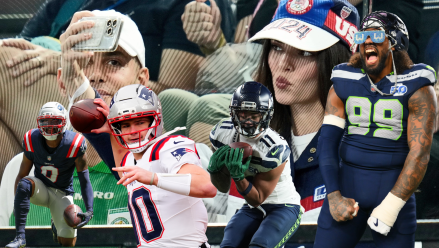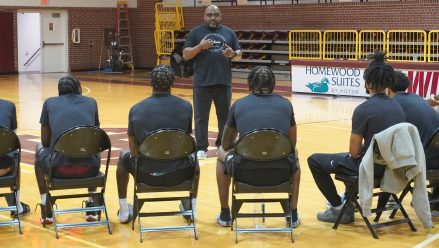Robert Walker’s book credits are almost exclusively historical fiction. Those are simpler endeavors, he said. He gets to decide the facts.
Walker’s second foray into historical non-fiction has been much more difficult. That shows — in the right way — because the former sportsbook operations manager at USBookmaking brings receipts in The House Always Wins — The Unlikely Rise of DraftKings and The Three Men Who Bet Everything.
The manuscript, which was made available to InGame, is a richly sourced and unvarnished look at the motivations and the methods that allowed Jason Robins, Matt Kalish, and Paul Liberman to evolve from three highly educated overachievers who met while working at Vistaprint into the co-founders (CEO, president, and president of global technology, respectively) of the massive DraftKings gambling empire.
The book, which has not been published, considers the group and its impact with a critical eye from the first pages, but with an appreciation for what Walker considers the scale and quality of the work as an industry veteran.
“I really don’t want to kill anybody with this book,” Walker told InGame. “What I want to do is make it an interesting book. I think I’ve gone down that rabbit hole where it feels more like an indictment than a story.
“And the problem is, it feels that way because there’s some stuff that happened that probably they wouldn’t have wanted to happen in hindsight.”
A multi-layered yarn
Walker sees the project as a combination of two main narratives:
- The trio’s formative period when the caffeine-and-ramen-fueled spreadsheet nerds honed their affection for and talent at mining data to find the secret for stoking the digital cravings of future gamblers.
- DraftKings’ emergence out of a turbulent period to pivot from daily fantasy to sports betting after the fall of the Professional and Amateur Sports Protection Act in 2018.
“They developed this unbelievable player profiling and VIP system that’s just unprecedented,” Walker said. “It was just unbelievably good. And I think there’s a reason why FanDuel and DraftKings are a solid one and two, and it’s not only due to them having a head start.
“I think the story has so many layers and components, and I don’t want to focus on the negative, which is obviously problem gambling. … And I don’t want to come across as [overly negative] because what these three guys did is both remarkable and scary at the same time.”
The book delves deeply into the scrawled whiteboards of a Vistaprint conference room nicknamed “The Laboratory”and cramped apartments and how minute details plumbed there spurred the founders toward finding the sweet spot between human psychology and optimized monetization. At the same time, it debates the ethics of creating something so potentially addictive without understanding the ramifications.
Writes Walker: “In a nine-by-eleven-foot bedroom in Watertown, Massachusetts, three friends had built the future of American gambling while pretending they hadn’t.”
Walker has sought interviews with each of the founders.
“In a nine-by-eleven-foot bedroom in Watertown, Massachusetts, three friends had built the future of American gambling while pretending they hadn’t.”
The House Always Wins — The Unlikely Rise of DraftKings and The Three Men Who Bet Everything
“My take, just writing a book without talking to them and getting their side was, they built this based on everything that they knew from Vistaprint, what they knew from their own ability, and how driven they were. And they never thought about the negative consequences,” Walker said. “I don’t think they ever said, ‘Listen, we can take all this person’s money here,’ or ‘This person can lose all their money.’
“I don’t think they thought in terms of the problem gambling, because they weren’t in the gambling business. Nobody’s gone broke buying business cards. So you have this model, and this model works, and they made it much better.”
Origin story left many breadcrumbs
Walker admits that he was surprised at the copious amount of publicly available data regarding the founders and DraftKings’ origin. Harvesting company records from the founders’ formative time at Vistaprint, corporate filings, and even sign-in logs before statehouse testimony, Walker weaves an elaborate tapestry. He hopes the founders will agree to interviews before some spasm in the sports betting ecosystem — read: prediction markets — requires new chapters for the self-published project.
Walker wants Robins, and well as Liberman and Kalish — both of whom he met several years ago — to like the book. Considering their level of detail-orientation chronicled in it, they would figure to appreciate his process, if not his inferences.
“I do care,” Walker said of their possible reaction. “It’s funny, when I talked to Matt and Paul, when they came out and I met with them, I told them that their story would make a great movie, because it’s really unbelievable.”
Multiple rewrites have made more accessible what Walker admits originally read like a term paper, while maintaining the edge with which he analyzes DraftKings’ business fumbles, like the DFS ad wars, overspending, and not foreseeing a regulatory reckoning.
“I tried to write it like Moneyball,” he admitted. “I’m pretty sarcastic in it. It’s hard as a nearly 40-year veteran not to be opinionated.”
Walker assumes the audience for the book will initially be from the gambling industry, then readers who come with a predisposed opinion about DraftKings. He hopes, for multiple reasons, readership is broad.
“It has to be entertaining to an extent,” he said. “If it’s just industry people, then I don’t think it makes any sense. Because I think it’s a really good story about three people that had a dream and really figured it out in a way that we’ve never seen before.”






